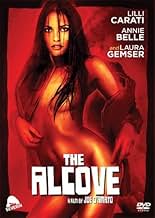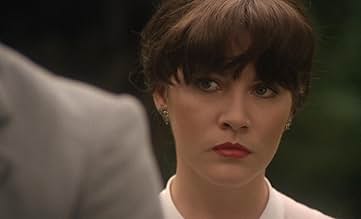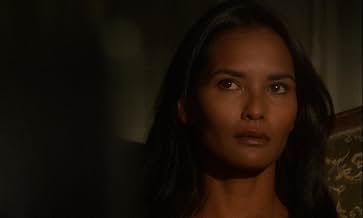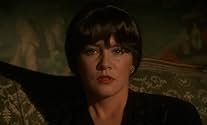In 1936 Italy, a husband returns from Africa with a tribal king's daughter, unaware his neglected wife has become involved with his secretary.In 1936 Italy, a husband returns from Africa with a tribal king's daughter, unaware his neglected wife has become involved with his secretary.In 1936 Italy, a husband returns from Africa with a tribal king's daughter, unaware his neglected wife has become involved with his secretary.
- Director
- Writer
- All cast & crew
- Production, box office & more at IMDbPro
Featured reviews
Alcove, The (1984)
** (out of 4)
Interesting tale from D'Amato about a Captain (Al Cliver) returning from a battle in Africa where he was given a slave, Zerbal (Laura Gemser) as a gift for saving a tribal leader. Back at home his wife (Lilli Carati) is having an affair with her secretary (Annie Belle) but soon Zerbal begins to come between them but it might be more than just your typical lesbian affair. I was really surprised with this film because it's actually very well-made and features a pretty good story. One is probably going to walk into this thing expecting nothing but a sex romp and while there is a lot of sex it really never takes center stage over the story being told. D'Amato made a very long career out of sex movies so this one here is certainly a lot different than many of the items he was releasing around this period. What really stands out is the actual production. The film takes place during the 1940s so we've got the older cars, costumes and set design, all of which is extremely good looking. Another plus is the cinematography from D'Amato, which to me is his greatest aspect (a lot better than his directing). All of this makes for a pretty interesting atmosphere and most of the sex scenes are quite erotic (though some enter a camp level). The film also benefits from an fun Euro-cult cast with Gemser leading the way as the obvious sex object to everyone. If you've seen any of her films with D'Amato then you should know what to expect. Belle really stands out and delivers a fine performance as does Carati. Cliver, God bless him, is his usual fun self. What keeps the movie from being even better is its rather slow pacing and it also goes on a tad bit too long at 93-minutes. I think a good ten minutes could have been cut out and we really wouldn't have lost anything story-wise. The film is pretty straight-forward and is well-made but at the end of the day this here is still going to be for D'Amato completest only.
** (out of 4)
Interesting tale from D'Amato about a Captain (Al Cliver) returning from a battle in Africa where he was given a slave, Zerbal (Laura Gemser) as a gift for saving a tribal leader. Back at home his wife (Lilli Carati) is having an affair with her secretary (Annie Belle) but soon Zerbal begins to come between them but it might be more than just your typical lesbian affair. I was really surprised with this film because it's actually very well-made and features a pretty good story. One is probably going to walk into this thing expecting nothing but a sex romp and while there is a lot of sex it really never takes center stage over the story being told. D'Amato made a very long career out of sex movies so this one here is certainly a lot different than many of the items he was releasing around this period. What really stands out is the actual production. The film takes place during the 1940s so we've got the older cars, costumes and set design, all of which is extremely good looking. Another plus is the cinematography from D'Amato, which to me is his greatest aspect (a lot better than his directing). All of this makes for a pretty interesting atmosphere and most of the sex scenes are quite erotic (though some enter a camp level). The film also benefits from an fun Euro-cult cast with Gemser leading the way as the obvious sex object to everyone. If you've seen any of her films with D'Amato then you should know what to expect. Belle really stands out and delivers a fine performance as does Carati. Cliver, God bless him, is his usual fun self. What keeps the movie from being even better is its rather slow pacing and it also goes on a tad bit too long at 93-minutes. I think a good ten minutes could have been cut out and we really wouldn't have lost anything story-wise. The film is pretty straight-forward and is well-made but at the end of the day this here is still going to be for D'Amato completest only.
Following a successful campaign in Africa, soldier Elio De Silveris (Al Cliver) returns home to his wife Alessandra (Lilli Carati) bearing all manner of exotic souvenirs, the most unusual being Zerbal (Laura Gemser), an Abyssinian princess presented to him as a slave in return for saving the king's life.
At first Allesandra is hostile to Zerbal, as is Elio's sexy secretary Wilma (Annie Bell), with whom Allesandra has been having a lesbian affair in her husband's absence; but when ownership of Zerbal is transferred to Allessandra (in a strange ritual that entails plenty of licking), the lusty wife's attitude does a 180 degree turn and she takes the dusky maiden for her lover, putting Wilma's nose severely out of joint. Soon, scheming Zerbal becomes the domineering force in the household.
This mid-career effort from prolific Italian sleaze merchant Joe D'amato sees the seasoned exploitation director tentatively entering Tinto Brass territory, delivering plenty of 1930s period charm, an atmosphere of constant sexual tension, loads of lush cinematography, and, of course, oodles of soft-focus, soft-core coupling with the emphasis on lesbianism. No stranger to capturing smut on camera, D'amato masterfully handles the steamy action, concentrating his attention on the sensuality of the lovemaking, although one can sense that the director is yearning to go further, his camera permanently on the prowl for even the slightest glimpse of snatch.
Eventually, Joe just can't help himself and sneaks in some genuine hardcore filth and old school exploitation during the film's final act: the graphic sex arrives in the form of a (genuine?) vintage stag flick screened by Elio, who intends to raise some much needed cash by making similar films, with his three women as his stars. Amazingly, the ladies agree to the project, but when the camera begins to roll, in true D'amato style, events turn decidedly nasty: Wilma is bound and abused by Allesandra and Zerbal, and raped by Elio's eager gardener Pepe (who has been planning to tend to her bush ever since spying it in the garden). After the ordeal is over, an understandably upset Wilma vows to make them pay for what they have done to her.
From an exploitation fan's point of view, this lurid rape/revenge scenario is a great way to end matters, and narrowly saves The Alcove from being just another vapid mid-eighties piece of Euro-erotica. Not essential D'amato, but not entirely worthless either, I rate The Alcove a reasonable 5.5 out of 10, rounded up to 6 for IMDb.
At first Allesandra is hostile to Zerbal, as is Elio's sexy secretary Wilma (Annie Bell), with whom Allesandra has been having a lesbian affair in her husband's absence; but when ownership of Zerbal is transferred to Allessandra (in a strange ritual that entails plenty of licking), the lusty wife's attitude does a 180 degree turn and she takes the dusky maiden for her lover, putting Wilma's nose severely out of joint. Soon, scheming Zerbal becomes the domineering force in the household.
This mid-career effort from prolific Italian sleaze merchant Joe D'amato sees the seasoned exploitation director tentatively entering Tinto Brass territory, delivering plenty of 1930s period charm, an atmosphere of constant sexual tension, loads of lush cinematography, and, of course, oodles of soft-focus, soft-core coupling with the emphasis on lesbianism. No stranger to capturing smut on camera, D'amato masterfully handles the steamy action, concentrating his attention on the sensuality of the lovemaking, although one can sense that the director is yearning to go further, his camera permanently on the prowl for even the slightest glimpse of snatch.
Eventually, Joe just can't help himself and sneaks in some genuine hardcore filth and old school exploitation during the film's final act: the graphic sex arrives in the form of a (genuine?) vintage stag flick screened by Elio, who intends to raise some much needed cash by making similar films, with his three women as his stars. Amazingly, the ladies agree to the project, but when the camera begins to roll, in true D'amato style, events turn decidedly nasty: Wilma is bound and abused by Allesandra and Zerbal, and raped by Elio's eager gardener Pepe (who has been planning to tend to her bush ever since spying it in the garden). After the ordeal is over, an understandably upset Wilma vows to make them pay for what they have done to her.
From an exploitation fan's point of view, this lurid rape/revenge scenario is a great way to end matters, and narrowly saves The Alcove from being just another vapid mid-eighties piece of Euro-erotica. Not essential D'amato, but not entirely worthless either, I rate The Alcove a reasonable 5.5 out of 10, rounded up to 6 for IMDb.
Several of my fellow reviewers here, some of which I have known for years and usually always concur with, have referred to "The Alcove" as a beautiful and stylishly eroticist period-piece, AND as one of writer/director Joe D'Amato's best works. Alas, I can't say I agree this time. I found "The Alcove" dull and dumb, and with such an overload of lesbian sequences that it becomes monotonous quite fast.
Set in the mid-1930s, Al Cliver depicts a soldier/writer - and 'slash' swindler - who brings home a beautiful and submissive African Princess (= sex slave) and offers her to his wife Alexandra. The nymphomaniac Alexandra was already feasting her sexual lusts on her hubby's cute secretary Velma during his many trips away from home, and thus she certainly doesn't mind a fresh and sensual new bed partner! Velma is jealous and sees evil in Zerbal, but Alexandra gradually becomes obsessed with her. Velma is right, though, as Zerbal's sole mission is to get revenge for the abusive, racist, and disrespectful way she has been treated.
Okay, here's how I see it... Our pervy pal Joe D'Amato had the privilege of working with three of the most sensationally luscious women of the Italian exploitation industry: Laura Gemser, Lili Carati, and Annie Belle. He simply had to get maximum benefit out of that. Every smallest and most banal situation somehow turns into a lesbian orgy, and evidently there's always someone peeping up a skirt or through a keyhole. Towards the end, D'Amato even turns his cast into an amateur porno-movie gang, complete with nuns' outfits and savage rape by the drooling gardener. What's so stylish or erotic about that?
Set in the mid-1930s, Al Cliver depicts a soldier/writer - and 'slash' swindler - who brings home a beautiful and submissive African Princess (= sex slave) and offers her to his wife Alexandra. The nymphomaniac Alexandra was already feasting her sexual lusts on her hubby's cute secretary Velma during his many trips away from home, and thus she certainly doesn't mind a fresh and sensual new bed partner! Velma is jealous and sees evil in Zerbal, but Alexandra gradually becomes obsessed with her. Velma is right, though, as Zerbal's sole mission is to get revenge for the abusive, racist, and disrespectful way she has been treated.
Okay, here's how I see it... Our pervy pal Joe D'Amato had the privilege of working with three of the most sensationally luscious women of the Italian exploitation industry: Laura Gemser, Lili Carati, and Annie Belle. He simply had to get maximum benefit out of that. Every smallest and most banal situation somehow turns into a lesbian orgy, and evidently there's always someone peeping up a skirt or through a keyhole. Towards the end, D'Amato even turns his cast into an amateur porno-movie gang, complete with nuns' outfits and savage rape by the drooling gardener. What's so stylish or erotic about that?
An English soldier (Cliver) returns home from the Zulu war with the daughter of a tribal king (Gemser) as his slave (a gift that he was given for "saving" the kings life). The spoils of war, ya know? While he's been gone, his wife has been having an affair with the female housekeeper (Belle). Not at all pleased with being a slave, the Ebony princess notices the mistress of the house engaging in a quick bit of foreplay with the housekeeper and plots her revenge starting with the seduction of the mistress. Jealousy spreads like wildfire and before you know it, she has turned the household into a lustful frenzy of sex and hatred. I can't give away too much more or it would ruin the story, but there are plenty of little twists along the way. Speaking of twists, this film is actually far more twisted than it sounds. One of the more disturbing moments being a sequence about the filming of an inquisition-themed porno that turns into the sadistic rape of a lesbian / virgin by the filthy and none too bright gardener. Sporting tons of full-frontal nudity, simulated lesbian and straight sex and some hard-core (as seen in an old stag film), this has the sleazy goods to go along with the D.H. Lawrence-ish setting and atmosphere, and is definitely recommended for fans of such.
Joe D'Amato's 1985 film, "L'alcova," weaves a tale that combines the allure of eroticism with the complexities of human relationships against a backdrop of historical intrigue. Set in the aftermath of World War II, the narrative unfolds within the confines of a luxurious, yet eerie, mansion, where the lines between power, lust, and control blur seamlessly.
The story centers on Elio, a soldier returning from the war with an unexpected companion, a beautiful African woman named Zerbal. This unconventional addition to his household sparks a volatile dynamic with his wife, Alessandra, who is both fascinated and threatened by Zerbal's presence. The tension is palpable as these characters navigate their desires and ambitions within the opulent, but increasingly claustrophobic, walls of their home.
D'Amato's direction is characterized by his signature blend of explicit eroticism and dramatic tension. The film does not shy away from graphic content, which is portrayed with a raw, unapologetic lens. This explicitness, while integral to the story, often feels gratuitous and detracts from the potential for deeper emotional and psychological exploration. The erotic scenes, rather than enhancing the narrative, sometimes seem to exist for their own sake, serving more as a distraction than a complement to the storyline.
The performances are a mixed bag. Al Cliver, as Elio, brings a rugged charm to his role, convincingly portraying a man torn between his past experiences and his present desires. Lilli Carati, as Alessandra, delivers a performance that oscillates between vulnerability and steely resolve, capturing the essence of a woman grappling with her own identity and the shifting dynamics of her marriage. Laura Gemser's portrayal of Zerbal is both enigmatic and compelling, though her character is often reduced to a mere object of desire, which limits the scope of her role.
Visually, "L'alcova" is a feast for the eyes. The cinematography, with its rich color palette and meticulous attention to period detail, creates an atmosphere that is both lavish and suffocating. The mansion, almost a character in itself, exudes a sense of decadence and decay, mirroring the tumultuous relationships of its inhabitants. The use of lighting and shadow plays a significant role in accentuating the film's themes of secrecy and revelation.
The narrative, however, struggles to maintain coherence. The pacing is uneven, with moments of intense drama interspersed with languid, almost stagnant scenes. This inconsistency hampers the overall flow of the film, making it challenging to stay fully engaged. Moreover, the dialogue often feels stilted and overly theatrical, which detracts from the authenticity of the characters' interactions.
Ultimately, "L'alcova" is a film that tantalizes with its promise of erotic intrigue and psychological complexity but falls short of delivering a truly satisfying experience. It is a visual and sensory journey that is marred by narrative and character development flaws. The film's ambition to intertwine historical context with personal drama is commendable, yet it never fully realizes its potential.
The story centers on Elio, a soldier returning from the war with an unexpected companion, a beautiful African woman named Zerbal. This unconventional addition to his household sparks a volatile dynamic with his wife, Alessandra, who is both fascinated and threatened by Zerbal's presence. The tension is palpable as these characters navigate their desires and ambitions within the opulent, but increasingly claustrophobic, walls of their home.
D'Amato's direction is characterized by his signature blend of explicit eroticism and dramatic tension. The film does not shy away from graphic content, which is portrayed with a raw, unapologetic lens. This explicitness, while integral to the story, often feels gratuitous and detracts from the potential for deeper emotional and psychological exploration. The erotic scenes, rather than enhancing the narrative, sometimes seem to exist for their own sake, serving more as a distraction than a complement to the storyline.
The performances are a mixed bag. Al Cliver, as Elio, brings a rugged charm to his role, convincingly portraying a man torn between his past experiences and his present desires. Lilli Carati, as Alessandra, delivers a performance that oscillates between vulnerability and steely resolve, capturing the essence of a woman grappling with her own identity and the shifting dynamics of her marriage. Laura Gemser's portrayal of Zerbal is both enigmatic and compelling, though her character is often reduced to a mere object of desire, which limits the scope of her role.
Visually, "L'alcova" is a feast for the eyes. The cinematography, with its rich color palette and meticulous attention to period detail, creates an atmosphere that is both lavish and suffocating. The mansion, almost a character in itself, exudes a sense of decadence and decay, mirroring the tumultuous relationships of its inhabitants. The use of lighting and shadow plays a significant role in accentuating the film's themes of secrecy and revelation.
The narrative, however, struggles to maintain coherence. The pacing is uneven, with moments of intense drama interspersed with languid, almost stagnant scenes. This inconsistency hampers the overall flow of the film, making it challenging to stay fully engaged. Moreover, the dialogue often feels stilted and overly theatrical, which detracts from the authenticity of the characters' interactions.
Ultimately, "L'alcova" is a film that tantalizes with its promise of erotic intrigue and psychological complexity but falls short of delivering a truly satisfying experience. It is a visual and sensory journey that is marred by narrative and character development flaws. The film's ambition to intertwine historical context with personal drama is commendable, yet it never fully realizes its potential.
Did you know
- TriviaThe credits claim the screenplay is based on a novel by a Judith Wexley. Several researchers have said they could find no trace of this novel, and it apparently does not exist.
- GoofsThe movie is set after the Anglo-Zulu war of 1879 when the British imperial and colonial forces invaded Zululand, a war which spanned for six months. After this war, the English soldier Elio returns to Italy where he now lives. But clothes worn by the characters match the 1920s and 1930s better than they do the 1870s. Among Elio's possessions is a car. According to a movie car database this car is a Lancia Augusta which was in production between 1933 and 1936. Also, the family listens to Italian fascist propaganda about "Il Duce", Benito Mussolini, on a 20th century radio set. The fascist Mussolini was in power from 1922 to 1943.
- Quotes
Wilma: You hypocritical sow!
Alessandra: I love you too, Mata Hari.
- Alternate versionsWhen released in the UK in 1995 this title was cut by 1 minute and 45 seconds by the BBFC.
- ConnectionsFeatured in Il vizio infinito (1992)
- How long is L'alcova?Powered by Alexa
Details
Contribute to this page
Suggest an edit or add missing content























